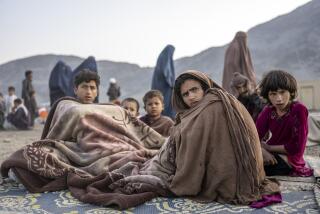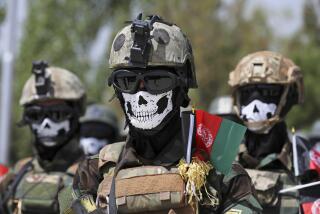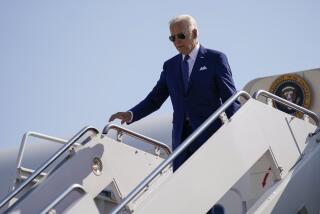Najibullah Urges Refugees’ Return : Afghan Leader Makes Appeal at Farewell for Soviet Troops
- Share via
KABUL, Afghanistan — President Najibullah of Afghanistan offered an emotional farewell Monday to departing Soviet troops, then appealed to 4 million Afghan refugees in Pakistan and Iran to come home.
“Come back to your beautiful country,” Najibullah urged the refugees. “Return to your families. All necessary conditions have been provided for your normal life.”
Najibullah spoke at a festive ceremony on the outskirts of Kabul, the Afghan capital. He embraced a Soviet general and said that now that the Soviet troops are leaving, “the claim of interference in our internal affairs has been removed.”
Two Soviet generals also spoke, as hundreds of Afghan children clambered over Soviet tanks and armored personnel carriers. An armored column of 250 vehicles, which earlier had moved through the streets of Kabul on a route that took it past the U.S. Embassy, was drawn up on the road in front of a reviewing stand, poised to head north for the Soviet border.
The crowd of about 5,000 was made up mainly of government workers, nearly all members of the ruling People’s Democratic Party. They had been excused from work for the occasion.
Najibullah led the crowd in cheers for the Soviet soldiers, most of whom had come in Sunday from their garrison at Jalalabad, about 80 miles east of Kabul.
The first units of the Soviet force here, estimated to total 115,000 troops, began their journey home Sunday under the terms of an agreement signed last month in Geneva. The agreement calls for the withdrawal to be completed within nine months.
After the Soviet Union sent its troops into Afghanistan in 1979, a wave of refugees--nearly a quarter of the Afghan population--flooded neighboring Pakistan and Iran. The refugee community in Pakistan became the base for the U.S.-backed moujahedeen rebels who have since been battling Soviet and Afghan government troops.
Najibullah called on his party, which he says has more than 200,000 members, including 150,000 in the armed forces, to patch up its factional differences. The party has a history of bitter rifts, including bloody clashes between the two main factions, the Khalq and the Parcham.
It was party instability that led to Moscow’s intervention. In December, 1979, Premier Hafizullah Amin, a leader of the Khalq faction, was assassinated and replaced by Babrak Karmal, a leader of the Parcham faction. In 1986, Karmal was replaced by Najibullah, also a Parcham member. The majority of the party’s members are believed to be Parcham followers, though several government officials are Khalq men.
As Najibullah suggested in his speech, one of the biggest questions about the ability of his government to survive once the Soviet troops are gone is whether the feuding factions can resolve their differences. He urged them to “consolidate the unity of our party.”
“Our victory,” he said, “is embodied in monolithic unity.”
Western diplomats say the party’s total membership is much smaller than Najibullah indicated--100,000 at most--and that only 10,000 of them can be considered activists. Most of these are concentrated in Kabul.
According to the diplomats, divisions between the rival factions can be expected to surface as soon as the Soviets are gone, and this is expected to lead quickly to the disintegration of the government.
A senior Asian diplomat in close contact with the Afghan government said the squabbling has already begun. He said that Najibullah and his Parcham faction are much more inclined to offer peace terms to the rebels.
“The Khalq members,” he said, “do not want to offer terms. They say it would be a sign of weakness and that making such a concession to the enemy would demoralize the armed forces.”
In Washington, White House spokesman Marlin Fitzwater called the start of the Soviet troop pullout “a welcome first step in the Afghan people’s desire for independence and self-determination.”
Reading from a statement, Fitzwater said that the United States expects the withdrawal to proceed on schedule. He reiterated steadfast U.S. support for the rebels.
More to Read
Sign up for Essential California
The most important California stories and recommendations in your inbox every morning.
You may occasionally receive promotional content from the Los Angeles Times.










